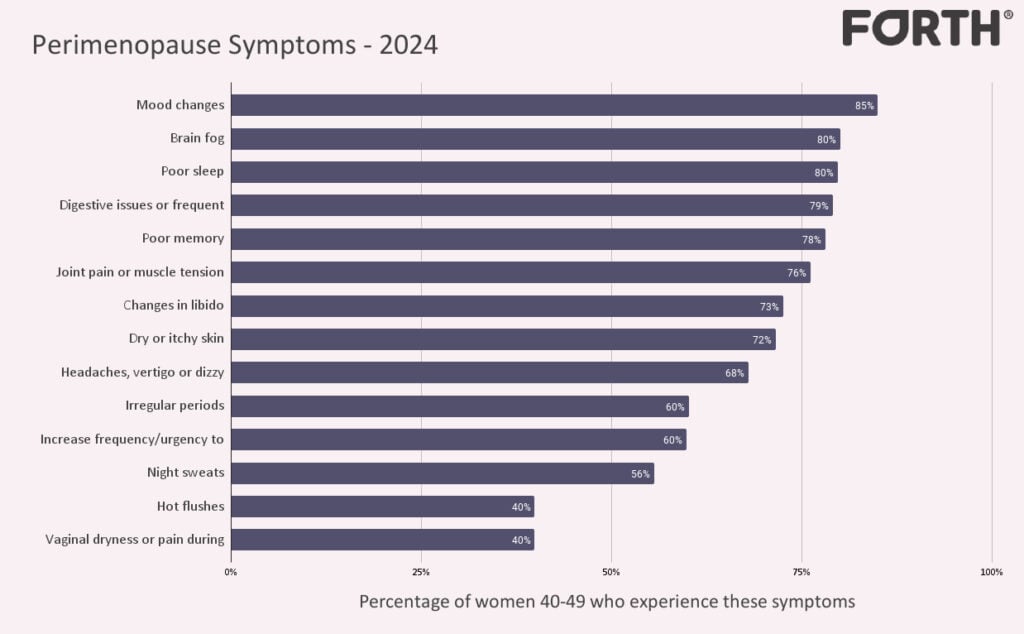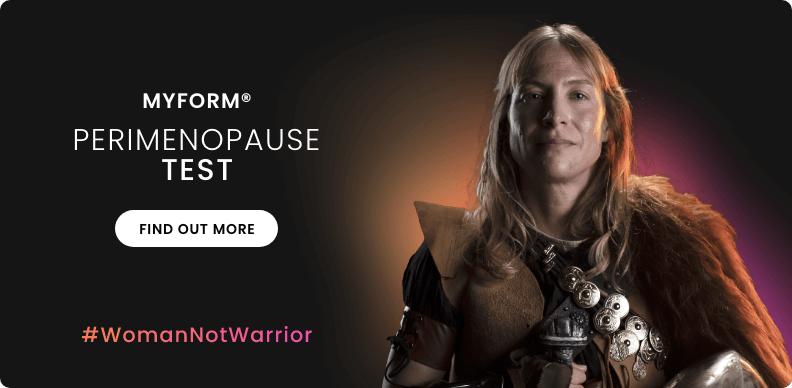4 mins read
Perimenopause Symptom Checker: Have I Started Perimenopause?

Perimenopause Symptom Quiz
Perimenopause is the phase that leads to menopause. Women tend to start perimenopause in their early 40s and it can last anywhere between 5 and 10 years.
Perimenopause has over 34 symptoms ranging from hot flushes, night sweats, to increased anxiety and brain fog. With other life pressures of family, care giving and career these symptoms are often overlooked as being part and parcel of a stressful life.
Note: this quiz is for educational purposes only and will not diagnose perimenopause.
Find out the most common symptoms on our 2023 Perimenopause Symptoms Statistics blog.
2024 Perimenopause Quiz Results
Thousands of women have completed our perimenopause quiz, sharing their experiences with each symptom. We report on our findings annually, and you can find our 2022 and 2023 perimenopause symptoms statistics in our blog.
We looked at the data from January 2024 and found the most common symptoms for women between 40-49 with irregular periods were:
- Mood changes – 85%
- Brain fog and poor sleep – both 80%
- Digestive issues or frequent bloating – 79%
Mood changes, brain fog, poor sleep and poor memory were all experienced by more than three-quarters of the women we surveyed in January 2024. These changes can make work more challenging. In a recent study on discrimination against menopausal women at work, we found over two-thirds (69.4%) of people believed women faced some form of discrimination due to perimenopause and/or menopause.

Despite hot flushes being one of the most talked about symptoms of peri/menopause, only 40% of women aged 40-49 report experiencing them. Night sweats were also near the bottom of the list, with just over half (56%) of perimenopausal women experiencing them.
This further highlights that symptoms alone cannot be used to diagnose perimenopause.
How Do You Know If You’ve Started Perimenopause?
The first step is to understand the symptoms of the perimenopause, and our quiz will help with that. The next step is to understand how your hormones fluctuate across your menstrual cycle.
As women go through perimenopause their levels of ovarian response hormones – oestrogen and progesterone – slowly decline, while their levels of the two control hormones – follicle-stimulating hormone (FSH) and luteinising hormone (LH) – increase.
Our advanced perimenopause hormone blood test will map these 4 key hormones across your entire menstrual cycle and will also provide you with our unique FORM score which will tell you how well your ovaries are responding to the two control hormones FSH and LH.
View our Hormone Tests and start your journey to better health today
Perimenopause Symptoms
The symptoms women experience while going through perimenopause can vary widely, some women will only experience a few, while others may find the symptoms impact their quality of life. The most common symptoms include:
- Irregular periods
- Hot flushes & night sweats
- Trouble sleeping
- Vaginal dryness
- Reduced sex drive (low libido)
- Mood swings
If you are not over 40 but are experiencing some of the above symptoms without any other cause, such as a hysterectomy, then you could be experiencing early onset of perimenopause.
However, it would be worth visiting your GP to discuss your symptoms so blood tests can be carried out to rule out other conditions such as thyroid issues.
As each woman is an individual, the age you start perimenopause and reach menopause will be unique to you.
The best way to confirm perimenopause is by taking our advanced perimenopause home blood test alongside our health questionnaire which will help confirm if your symptoms are due to a declining ovarian response.
- Health scores calculated
Close
This information has been medically reviewed by Dr Thom Phillips
Thom works in NHS general practice and has a decade of experience working in both male and female elite sport. He has a background in exercise physiology and has published research into fatigue biomarkers.

Dr Thom Phillips
Head of Clinical Services
Related articles
Like this article? Here are some more based on similar topics.






